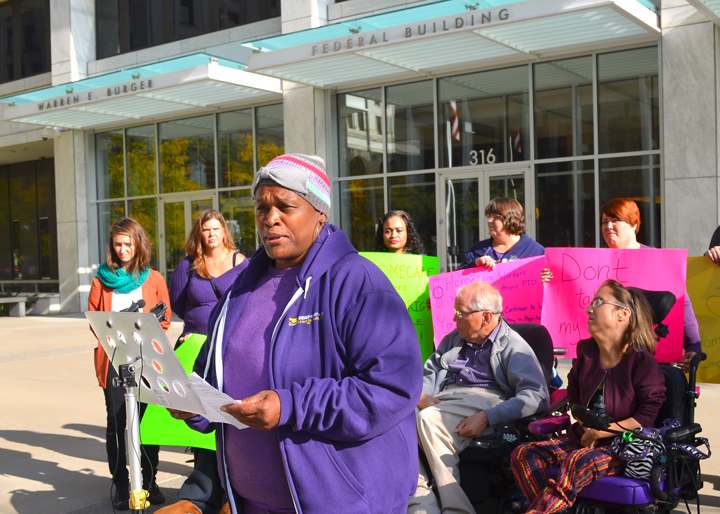

Share
While two panels of judges considered challenges to their collective bargaining rights, home health care workers rallied Wednesday outside the U.S. Federal Courthouse in St. Paul to reaffirm support for their union.
Several workers spoke to the media after the 8th U.S. Circuit Court of Appeals heard oral arguments in court cases that could have wide-ranging implications.
“It is wrong that extremists are trying to take away our union,” said Francis Hall, a home care worker from Crosby and member of SEIU Healthcare Minnesota. “It is wrong for workers in every corner of our state. It is wrong for the people we care for. We are going to stick together and keep fighting because we’ve come too far and the home care industry is too important to not stand up and fight back.”
Hall and other home care workers voted to unionize in 2014 and negotiated their first contract with the State of Minnesota this year. Last week, Hall became the first to utilize the paid time off provision in the contract, enjoying her first paid day off in more than 15 years of work.
Court officials said it was coincidence that the two challenges to the home health care union were being heard on the same day. The cases were before two different panels of judges and will be ruled on separately.
In the first case, an attorney for the National Right to Work Legal Defense Foundation spoke on behalf of nine home health care workers who filed suit against the state. William Messenger argued that unionization infringed on the free speech rights of home health care workers.
The certification of SEIU Health Care Minnesota as the representative of 26,000 home health care workers amounted to “compelling association” with the union, Messenger said.
Alan Gilbert, representing the State of Minnesota, said home health care workers are not required to join the union or pay dues. He said the plaintiffs must show they have been harmed in order for their argument to hold water.
A lower court ruled against the plaintiff’s request for an injunction to stop certification of the union. With the union certified and a contract negotiated, the case may be moot, Gilbert noted.
In the second case, Minneapolis attorney Douglas Seaton, arguing on behalf of six home health care workers who also filed suit against the state, said Minnesota’s law allowing collective bargaining for home health care workers is invalid because it is pre-empted by federal law.
Under the National Labor Relations Act, these workers are “domestic” workers who, along with agricultural workers and supervisors, are barred from collective bargaining, Seaton argued.
Minneapolis attorney Brendan Cummins, representing SEIU, said the state is free to enact its own collective bargaining laws for people not covered by the federal statute. For example, the NLRA excludes all government employees, but Minnesota and several other states have laws granting them the right to unionize, he said.
Workers who spoke in front of the courthouse said they are outraged that the legal challenges to their union are being bankrolled by the Koch brothers and other billionaires.
“This work is predominantly work done by women and people of color, and so I see this court case as a direct attack on women and people of color,” said Deb Howze, who has worked in health care for 20 years.
“We voted democratically to form our union so we can get the benefits that we deserve, such as a pay raise, sick time and access to training. These things help us better care for our clients. Our home care system has been broken for years. Many PCAs have worked around the clock without a break, overtime or even being paid at all for what we do. Why would the National Right to Work Legal Defense Foundation want to undo the work we’ve done to improve conditions for clients and PCAs? Why would they want to take our rights away? Why are they threatened by us standing up for ourselves?”
Supporters, including clients and representatives of other unions, joined the home health care workers.
“My home care workers assist me with almost every aspect of my life, from the time I put my three year old on the bus, to meetings, dinner, bed and many things in between. Without home care my life would look very different,” said Nikki Villavicencio of Maplewood. “That is why as a recipient of home care and a disability advocate I have been, and continue to be, a strong supporter of the home care workers’ union and am confident we will win this case.”
Mary Turner, representing the Minnesota Nurses Association, and Rodney Rowe, secretary-treasurer of Education Minnesota, said if anti-worker forces prevail against home health care workers in these cases, it would only be a matter of time before they increased attacks on the workplace rights of nurses, teachers and other workers.

